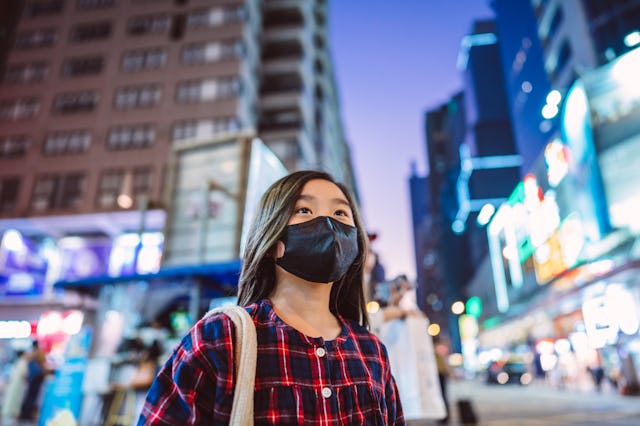Study: Air Pollution Linked To Child Behavioral And Cognitive Issues
Two experts weigh in on what parents can do to limit exposure.

While it may have always been a concern that air pollution could affect the way our kids breathe, it seems that it may also affect the way they think, develop, and behave into adulthood. Recent evidence from The University of Washington adds claim to the fact that both prenatal and postnatal exposure to air pollution can harm a child’s brain development. So, what does this mean for pregnant people and parents?
The study, published in the July issue of Environmental Health Perspectives, found that children whose mothers experienced higher nitrogen dioxide (NO2) exposure during pregnancy, especially in the first and second trimester, were more likely to have behavioral problems later in life.
As for children’s direct exposure to air pollution, researchers also reported that higher exposures to small-particle air pollution (PM2.5) when children were 2 to 4 years old was associated with poorer child behavioral functioning and cognitive performance.
The study gathered data from almost 2,000 mothers recruited during pregnancy from six cities: Memphis, Tennessee; Minneapolis; Rochester; San Francisco; and two in Washington, Seattle and Yakima.
Using a state-of-the-art model developed at the University of Washington, the study measured air pollution levels while using participants’ address information to estimate each mother and child's exposures to air pollution during the pregnancy period and early childhood.
In the first few years of a child’s life, ongoing brain development is at a critical state, as the number of neural connections explodes. The brain reaches 90% of its future adult size, the researchers write. For young children, inhaled pollutants that invade deep in the lung and enter the central nervous system can cause great damage in areas relevant for behavioral and cognitive function later down the line.
When studying the data, researchers also found that exposure to PM2.5 pollution was generally associated with more behavioral problems in girls than in boys, and that the adverse effect of PM2.5 exposure in the second trimester on IQ was stronger in boys.
"This study reinforces the unique vulnerability of children to air pollution — both in fetal life where major organ development and function occurs as well as into childhood when those processes continue. These early life perturbations can have lasting impacts on lifelong brain function. This study underscores the importance of air pollution as a preventable risk factor for healthy child neurodevelopment," said senior author Dr. Catherine Karr, a professor in the UW School of Public Health and School of Medicine.
So, how can pregnant people be proactive in protecting their baby from air pollution? Kimberly Yolton, Ph.D., director of research in the Division of General and Community Pediatrics at the American Academy of Pediatrics, believes it’s all about preparation.
“Pregnant mothers have a big responsibility and many things to worry about. Regarding air pollution, they can be proactive in protecting themselves and their babies by checking air quality indexes when planning outdoor excursions,” Yolton explained to Scary Mommy. “Weather apps and other sources can be used to learn more about current and expected air pollution in their region to plan the best times of day to be outside and specific areas and times to avoid.”
So, what about factors out of a parent’s control — like climate change? Patrick Ryan, a Ph.D., Division of Biostatistics and Epidemiology at the AAP, fears that climate change will result in more people being exposed to air pollutants and overall greater health effects, including impacts to child health and development.
“As climate change increases temperatures, we expect the number of poor air quality days to also increase. Second, particle pollution comes from many sources including forest fires. As these become more frequent and larger, the particles can travel long distances and cause air quality issues in locations that were previously unaffected and far away from the fires. In addition to these, natural disasters like hurricanes, extreme heat, droughts, and flooding all have downstream consequences that can negatively impact health,” he told Scary Mommy.
If a pregnant person or a parent is already aware of the exposures to air pollution, it’s important to keep an eye on how their child is developing. While there are no diagnostic tests to assess the damage from air pollution on fetal brain development, parents and pediatricians should pay attention to developmental milestones, such as sitting up, walking, talking, social skills, and behavior. Parents should reach out to their pediatrician when children have problems with motor skills, attention, language, or behavior.
All hope is not lost when it comes to the strengthening link between air pollution and child brain development. Dr. Kim Cecil, Ph.D., director of radiology research for the Imaging Research Center, says that kids are as resilient as ever. And while there is nothing a person can do per-say to “reverse” the affects of air pollution, there is always active changes parents and kids can make to maintain a healthy life.
“A child’s brain is constantly changing and adapting to overcome challenges from a variety of exposures and experiences such as pollution, infection, and other conditions. Healthy lifestyles with good nutrition and exercise, pursuing reading and other academic interests, stimulating and supportive experiences at home, school, and within the community are all things that strengthen brain circuitry,” she explained.
With climate change effects ever growing, and the risks of air pollution only getting greater, there is more pressure on parents and expecting parents to do everything they can to protect themselves and their children from lasting effects. Being proactive about climate conditions, keeping an eye on milestones and growth charts, as well as making an effort to promote a healthy lifestyle are just a few of the ways the experts believe can help avoid any missteps in child brain development due to air pollution.